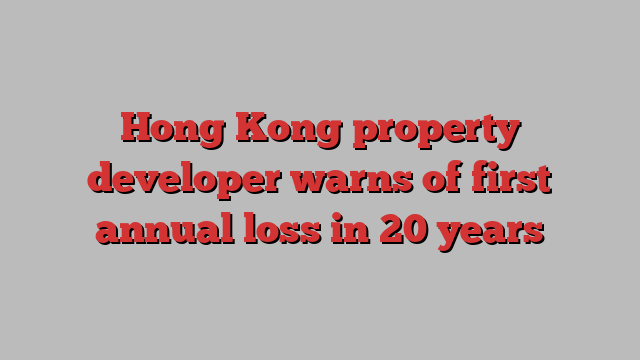
Unlock the Editor’s Digest for free
Roula Khalaf, Editor of the FT, selects her favourite stories in this weekly newsletter.
One of Hong Kong’s largest property developers said it expected to post its first annual loss in two decades due to the territory’s real estate downturn, sending its shares lower by 13 per cent on Monday.
New World Development, one of the territory’s biggest property groups controlled by the Cheng family and run by third-generation scion Adrian Cheng, said it expected to post a loss of up to HK$20bn (US$2.6bn) for the full year ended in June.
In a filing to the Hong Kong stock exchange after the market close on Friday, the company said it expected to book a revaluation charge of between HK$8.5bn and HK$9.5bn for its investment and development projects, marking its first annual loss since 2004.
UBS analysts said New World’s HK$20bn loss would be “substantial” and that it expected the company’s debt-to-equity ratio to grow.
Hong Kong tycoons including the Cheng family have been reeling under pressure from a years-long slump in the territory’s property market as higher US rates and China’s economic slowdown weigh on the city’s commercial rents and home prices.
Banks in the territory — where the currency is pegged to the US dollar — have raised mortgage rates, further depressing demand, while investments from wealthy mainland Chinese have slowed down.
New World, whose assets include major residential projects, shopping malls and office buildings, generated about 60 per cent of its revenue from property development and investment projects from the territory last year, with the rest from mainland China.
Prime office rent in Hong Kong has fallen about 15 per cent since the US Federal Reserve began raising rates in 2022, according to commercial property adviser Cushman & Wakefield. Home prices in Hong Kong have fallen more than 20 per cent over the same period, official data showed.
Gary Ng, a senior economist at Natixis, said he expected developers to come under more pressure. “If prices and rents continue to fall, more write-offs may still be on the cards,” he said.
Despite the possibility of lower US rates, the market is not in a position to absorb new supply, especially in long-term assets including commercial properties, Ng said.
New World said the writedown was a “proactive move” which “does not affect our cash flow and liquidity”.
It added: “This will better position us for the upcoming interest rate cut cycle where the overall property market is expected to rebound.”
Other major Hong Kong developers are also showing signs of pressure as a result of the property slump.
Henderson Land Development, controlled by the Lee family, in August reported a revaluation loss of HK$2.3bn in the first six months of the year for its completed and developing investment properties.
Sino Land said during its annual earnings report last week that its profit for the year ending in June dropped 25 per cent compared with the same period before and recorded a revaluation loss on its investment portfolio of HK$580mn.
China’s weakening consumption and office market downturn have also hit Hong Kong developers. Hang Lung Properties, which makes more than half of its revenue from property leasing in mainland China, said in July that revenue from the mainland fell more than 5 per cent in the first six months of the year compared with the same period in 2023.
Tenant sales at Hang Lung’s flagship Plaza 66 mall in Shanghai have dropped significantly, with the group saying that “lower-tier customers were more cautious on luxury spending”.
“There has been growing pressure,” said a senior executive at one of the major Hong Kong-based developers. “China’s economic expansion is slowing. The future is not bright, and people are spending less. The situation is worrying across different industries.”